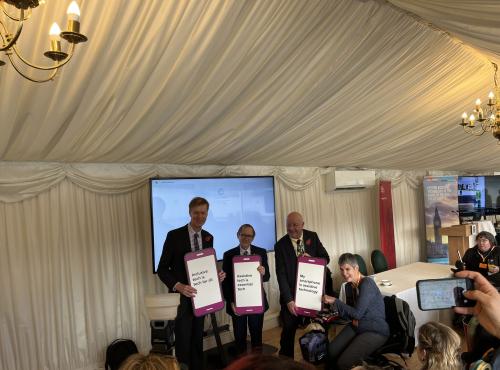Ever-steeper mountain to climb as government policy not keeping pace with Climate Change Committee recommendations – the latest from our Climate Policy Dashboard
New rankings from the Climate Policy Dashboard show an ever-steeper mountain to climb in the journey to net zero.
The Dashboard has been updated to reflect the latest policy recommendations from the Climate Change Committee for the government from 2022 onwards.
The Climate Policy Dashboard has been developed by Policy Connect for the All-Party Parliamentary Group on Climate Change, to monitor the government’s progress in meeting the recommendations set by the Climate Change Committee to reach net zero.
The dashboard is freely available and easy-to-use and provides at-a-glance rankings on government progress.
It continues to reflect the good progress made on reaching net zero, with policy in the power sector receiving a 7/10. However, this most recent update highlights significant gaps in the transport, waste, agriculture and land use sectors.
At a glance: the scores received by government policy in each key sector
- Power: 7/10 (previously 8/10)
- Agriculture and Land Use: 4/10 (previously 5/10)
- Waste: 2/10 (previously 3/10)
“More homework”
The dropping scores across the Climate Policy Dashboard reflect the additional policy recommendations set by the Climate Change Committee (CCC) for the government to meet in 2022 and beyond.
“The new scores for the Climate Policy Dashboard reflect the Climate Change Committee’s policy recommendations for the government for this year and beyond. The recommendations are in effect more “homework” given to the government in reaching net zero by 2050. There are a range of missing climate gaps in areas such as power, agriculture and land use, and waste which have been highlighted by the Climate Policy Dashboard. As the Committee on Climate Change said, there were many important climate strategies published last year and it is crucial that these are now translated into policy delivery and implementation.
“The Glasgow Climate Pact requires countries across the world to strengthen their emissions reduction targets this year to keep to the goal of 1.5C. As holders of the COP26 Presidency, the UK is in a unique position to lead this effort, not only with climate ambition, but climate action at home.”
Nazza Ahmed, Lead Researcher for the Climate Policy Dashboard
In detail: Mind the gap: the key policy recommendations from the CCC
- Power: The upcoming Electricity Network Strategy should enable investment in electricity networks, in line with anticipated increase in future demand.
- Transport: The government should fund and help develop competitive, large-scale battery recycling facilities in the UK for electric vehicle batteries.
- Manufacturing and Construction: The government must work with industry to set a standard for the ‘whole-life’ carbon footprint of buildings. A mandatory disclosure of ‘whole-life’ carbon in buildings should be introduced by 2025.
- Agriculture: The government should implement a decarbonisation strategy to reduce emissions in agriculture and land use. There must also be obligations set for water companies to restore peatland on land owned or for peatland owners in Sites of Special Scientific Interest.
- Waste: There are a lack of policies curbing the rise of emissions from energy from waste, which should be matched by a carbon tax aimed at cutting these emissions. The government should also work with the Environment Agency and industry to provide incentives to reduce process emissions from industrial wastewater plants.
Notes to editors
For more information please contact Alice Webster: Alice.Webster [at] policyconnect.org.uk (Alice[dot]Webster[at]policyconnect[dot]org[dot]uk) or 07526 936868.
Key Policy Recommendations from the Climate Change Committee
Power
- The government should use the upcoming Electricity Network Strategy to lay out policy priorities and measures to enable investment in electricity networks to align with increased future demand levels. This should consider large, localised demand increases associated with electrification in manufacturing, transport, and buildings.
Transport
- The government should fund and help develop competitive, large-scale battery recycling facilities in the UK for electric vehicle batteries.
- The government should commit to the UK’s first clean maritime cluster operating at commercial scale by 2030 at the latest, with zero-carbon fuels expanding to 33% of UK shipping fuel use by 2035. The CCC welcomes the inclusion of aviation and shipping emissions in the UK’s Sixth Carbon Budget but says that these should be accompanied by actionable policies to reduce emissions in these sectors.
Manufacturing and Construction
- The CCC recommends that government should work with industry to set a standard for the ‘whole-life’ carbon footprint of buildings and introduce mandatory disclosure of whole-life carbon in buildings and infrastructure by 2025 to enable benchmarking.
Agriculture
- The Climate Change Committee notes that there needs to be a decarbonisation strategy to reduce emissions in agriculture and land use, an area where more needs to be done.
- The CCC recommends that government should set obligations for water companies to restore peatland either on land owned or for peatland owners in Sites of Special Scientific Interest (SSSI).
- The CCC recommends that government should implement a strategy to address dietary shifts away from meat and dairy consumption. The Climate Change Committee states there should be low-cost, low-regret options to encourage a 20% shift away from all meat by 2030, rising to 35% in 2050, and a 20% shift from dairy products by 2030.
Waste
- The CCC says that there is still a lack of policies in curbing the rise of emissions from energy from waste.
- The CCC recommends that government introduces a carbon tax aimed at curbing the rising emissions from energy from waste and set out how existing energy from waste plants will be supported to be retrofitted with CCUS from late 2020s onwards.
- The CCC recommends that government should work with the Environment Agency and industry to provide incentives to reduce process emissions from industrial wastewater plants.



